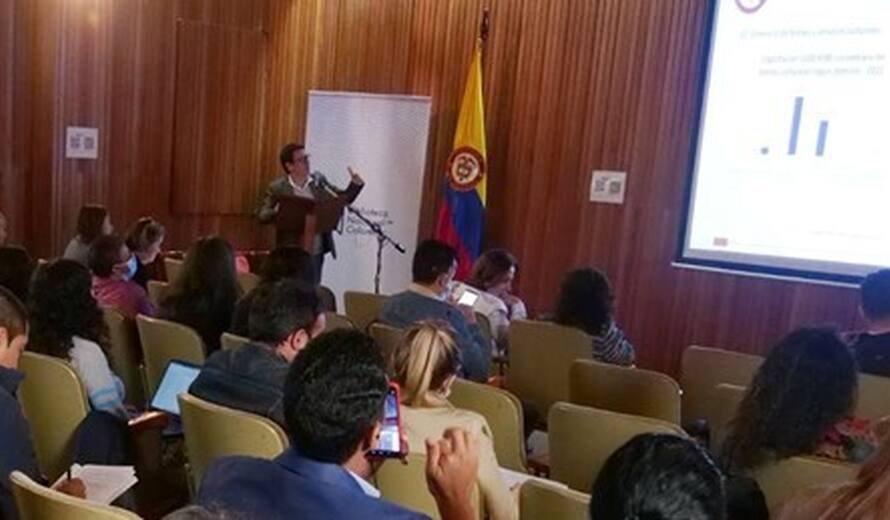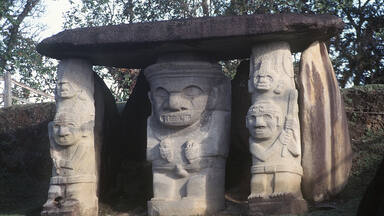Colombia and the city of Bogota Restitution workshop for the UNESCO Culture|2030 Indicators
On 15 July 2022, the final restitution workshop for the pilot implementation of the UNESCO Thematic Indicators for Culture in the 2030 Agenda (UNESCO Culture|2030 Indicators) was organized by the Ministry of Culture of Colombia and the District Secretariat of Culture, Recreation and Sports of Bogota in close collaboration with UNESCO. The workshop was held at the Aurelio Arturo Auditorium of the National Library of Colombia, gathering 52 participants, including representatives from national and local stakeholders, institutions, and authorities. The workshop was an opportunity to present the implementation results, demonstrating culture’s transversal contribution to sustainable development in the 2030 Agenda. The workshop also served to promote results dissemination, encourage policy action at national and urban level, and seek inputs from stakeholders on policy recommendations towards strengthening data collection, measurement, and monitoring for culture.
The pilot implementation of the UNESCO Culture|2030 Indicators in Colombia and Bogota was launched in November 2021 by the Ministry of Culture of Colombia and the District Secretariat of Culture, Recreation and Sports of Bogota in partnership with UNESCO and in collaboration with the UNESCO Institute for Statistics. Implementation was made possible thanks to the generous financial contribution of the Spanish Agency for International Development Cooperation (AECID).
The implementation succeeded in achieving the goal of collecting culture data and building the foundation for more reliable measurement systems to show the multiple ways culture contributes to the economic, social, and environmental dimensions of sustainable development. The UNESCO Culture|2030 Indicators framework is composed of 22 indicators in four thematic dimensions, measuring culture’s contribution as a sector of activity in itself and transversally as an intrinsic component present in other sectors.
This achievement was only made possible with the collaboration and engagement of a wide of range of stakeholders involved in the policy spectrum; Ministries, departments, Mayoral offices, municipalities, agencies operating in the four thematic dimensions of the framework, culture related organizations and networks, civil society and professional organizations, research institutions including academia and national institutes.
The workshop concluded the UNESCO Culture|2030 Indicators data collection and participants from Colombia and Bogota recognized the framework of the indicators as a breakthrough, underlining that it allowed them to refine the analysis of the transversal contribution of culture across policy domains and the different Sustainable Development Goals of Agenda 2030.
Mr. Ernesto Ottone R., Assistant Director-General for Culture of UNESCO, thanked Colombia and Bogota for participating in the pilot implementation and stressed that the data collected and analyzed will inform decision-makers, concrete measures and policies, with the aim of enabling greater investment in culture and further recognition of its cross-cutting role in other sectors. He believed that the UNESCO Culture|2030 Indicators would help decision-makers build a solid, coherent, and evidence-based discourse on culture and development. He hailed that the data collected will enrich the UNESCO Culture|2030 Indicators’ Data Bank, which will facilitate future updates and analysis of local, national, regional, and global trends. He also invited participants to consider the restitution workshop as a starting point in the process of monitoring and updating data on culture.
Ms. Adriana Padilla Leal, Vice-Minister of Creativity and Orange Economy of Colombia, delivered the welcoming message for the workshop. She indicated that the National Government has been advocating for the value of information as the main input available to understand the dynamics of cultural and creative ecosystems in the country. She highlighted that the Satellite Account of Culture and Orange Economy has become a measurement system at the forefront of the continent, while the challenge now relies in strengthening the Network of Observatories of Creative and Cultural Economy to further commit to innovation of measurement systems that allow consolidating public policies responding to the needs of creators and entrepreneurs in different territories. The Vice-Minister described UNESCO Culture|2030 Indicators and the presentation of the results as “an invitation to continue working as a network so that the value of information can be a trigger for strengthening policies that position culture as a pillar of development and social cohesion”.
Mr. Nicolas Montero, Secretary of Culture, Recreation and Sports of Bogota, delivered the welcoming message for the workshop on behalf of the city. The Secretary indicates that the implementation positions Bogota as a national and international benchmark in the development of measurements and statistics on culture’s contribution in achieving Sustainable Development Goals. He stressed that the generation of tangible and timely data provides solid tools to formulate policies and projects closer to realities of the culture sector. He stressed the great importance for Bogota of the pilot implementation and recalled solid engagement of his city to remain mobilized, indicating that for Bogota was an honor to be part of the pilot implementation and to be able to share with other cities around the world its knowledge and experience in the generation of statistical and economic information on the cultural sector, thus contributing to the strengthening, reactivation, and sustainability of cultural and creative agents.
Mr. Juan Felipe Parra, the National Expert for Colombia, contextualized the implementation of the framework and provided an overview of the main benefits obtained and the mechanisms put in place to support the activities.
Mr. Mauricio Agudelo, the Local Expert for Bogota, presented the urban perspective of the implementation and its significance for the city as an innovative framework to collect and analyze data on culture at the urban level, in view of elaboration of concrete policies and actions to foster sustainable development in Bogota.
Mr. Eduardo Saravia, UNESCO Regional Expert, provided an overview of the challenges and opportunities encountered in the implementation and presented the main findings in collaboration with the national and local experts.
The exchanges on the results of the implementation, facilitated during the workshop by the national and local implementation teams along with the UNESCO Regional Expert, will be instrumental to the finalization of the National and Urban Reports on the pilot implementation for Colombia and the city of Bogota.
The implementation highlighted the need for better collection of culture data including sex-disaggregated data in order to make visible the contribution of culture to Goal 5 on ‘Gender equality’, which is notably lacking on a more global level as well. The framework addresses SDG 5 transversally by allowing for the appreciation of sex-disaggregated data across a number of different data points from access to opportunities and participation in social, economic, political and cultural life. implementation sought to include sex-disaggregated data wherever possible.
Colombia was the first country in Latin America and the Caribbean region to successfully complete the pilot implementation. The workshop achieved its objective of presenting the main findings of the implementation of the UNESCO Culture|2030 Indicators, promoting results dissemination to encourage policy action at national and urban level and advocating for commitments from stakeholders to support future monitoring and data collection.
The meeting was closed by Mr. Juan Felipe Parra, National Expert for Colombia, who thanked all participants, the national and local teams and especially the stakeholders for their contribution during the project duration. He indicated that the results obtained reinforce the recognition of the transforming role of culture, which is unique and transversal to the Sustainable Development Goals. While many strengths and points of success were found, it is also valuable to work on those weaknesses and opportunities identified as a roadmap to further boost the Colombian cultural and creative sector and contribute to sustainable development.
For further information on the pilot implementation in Colombia and in the city of Bogota, please consult the following webpage: https://whc.unesco.org/en/activities/1193/
To learn more about the UNESCO Culture|2030 Indicators framework, please consult the following webpage: UNESCO Culture|2030 Indicators
Bogota, Colombia


